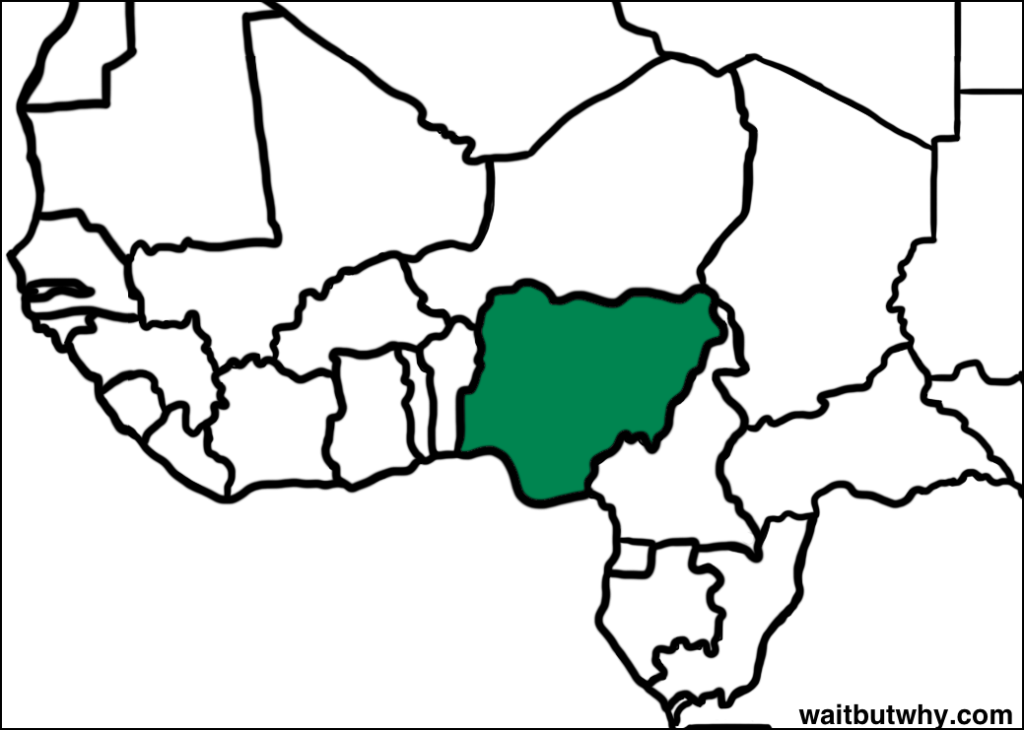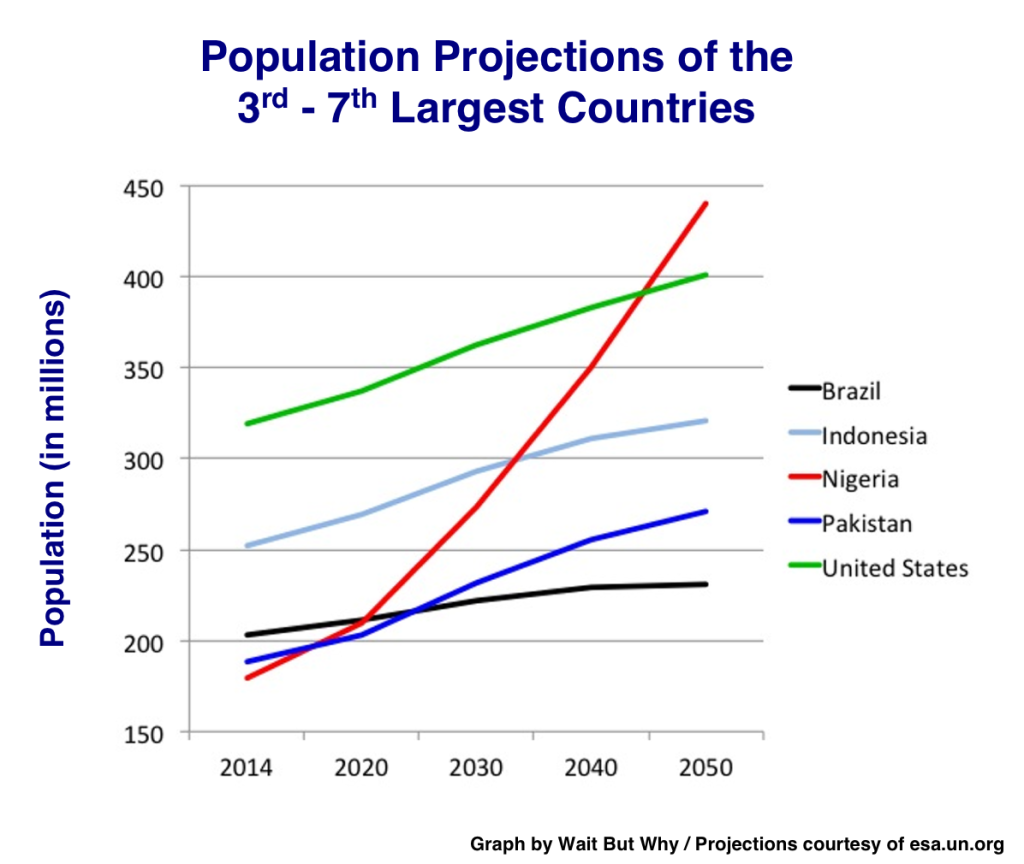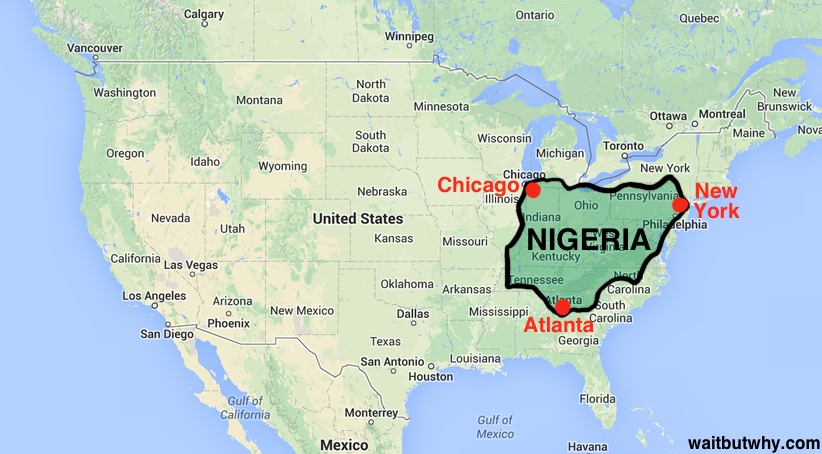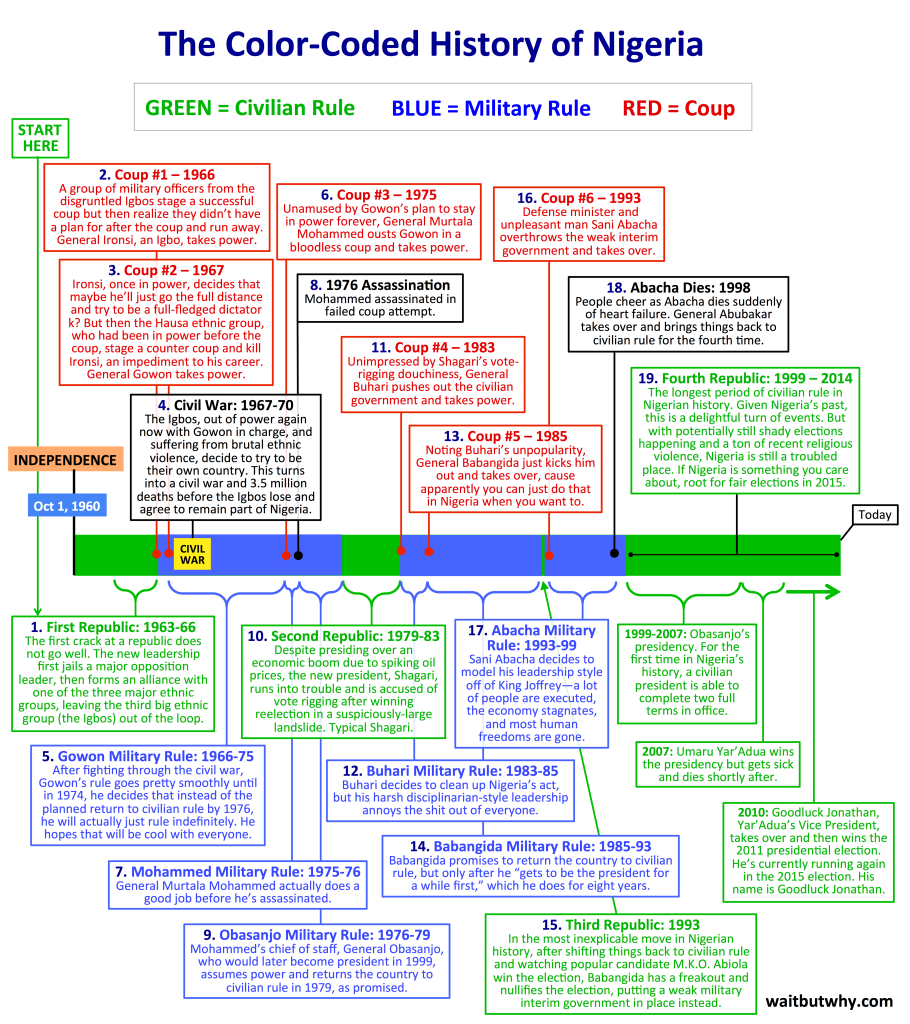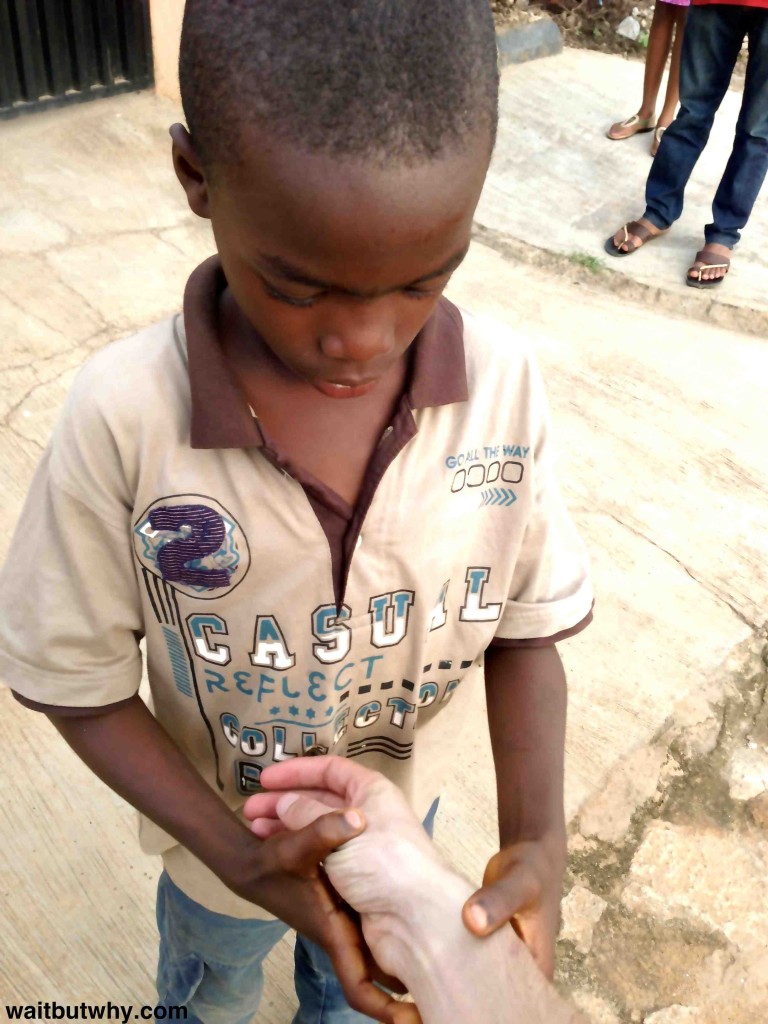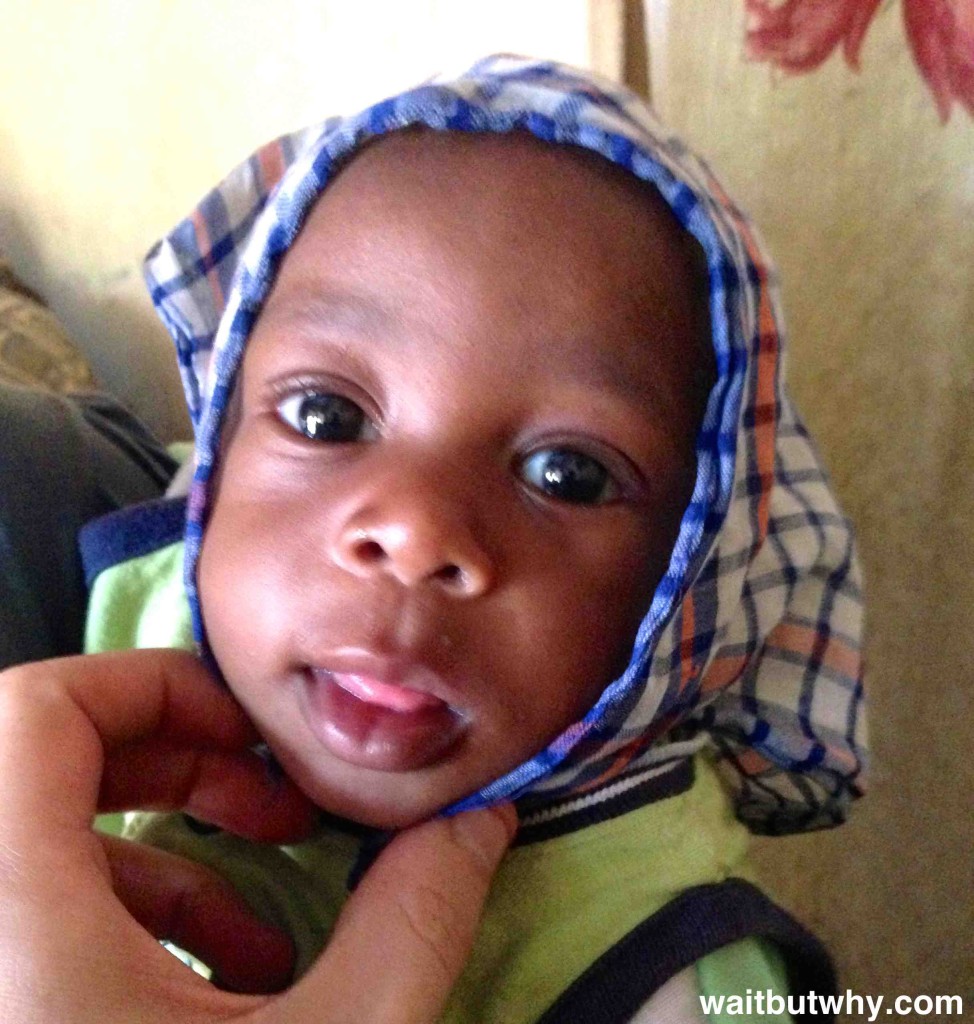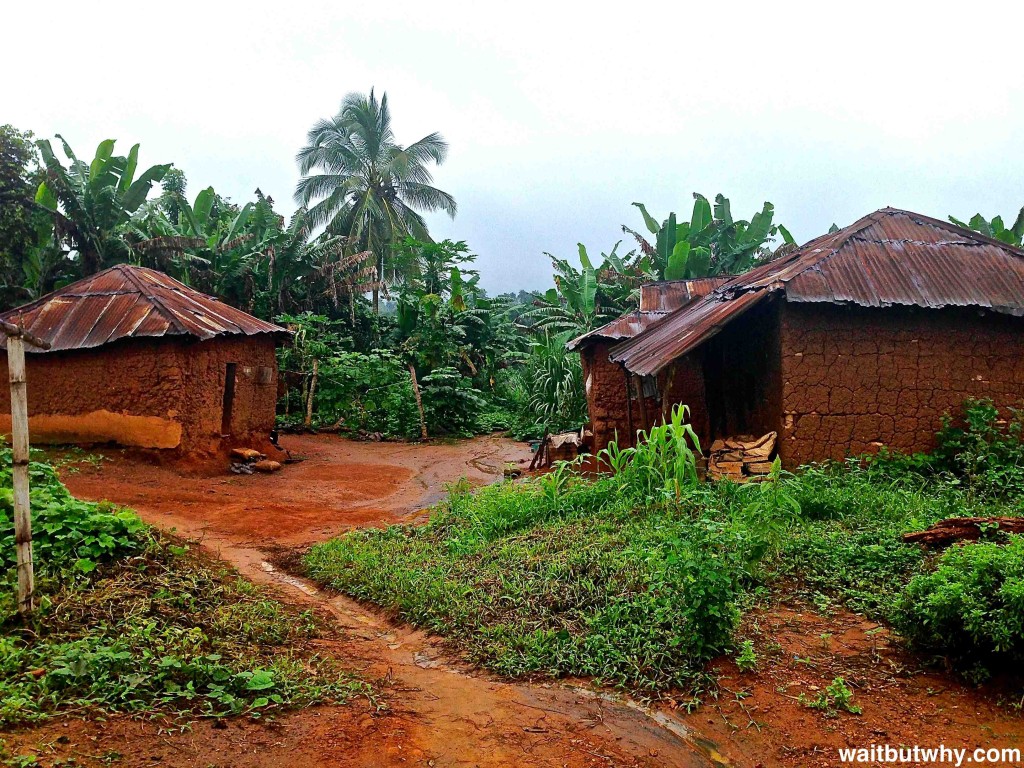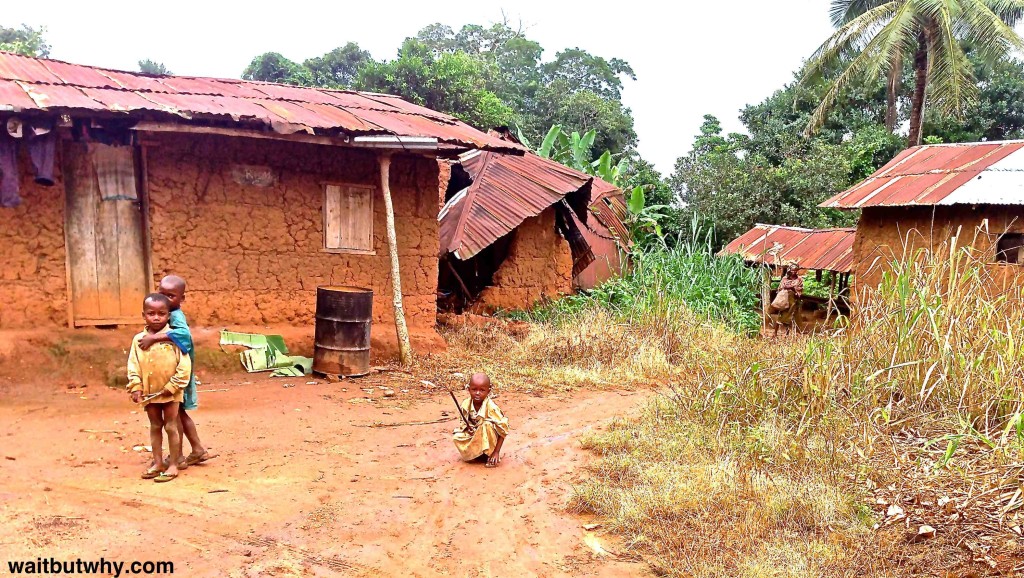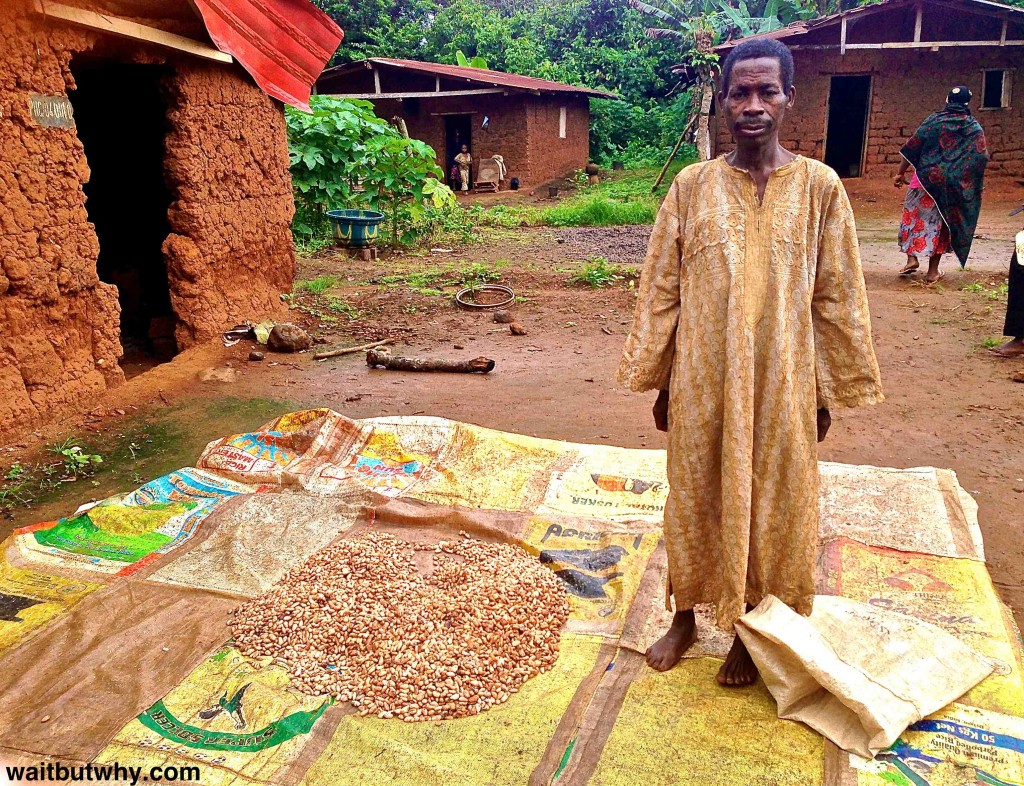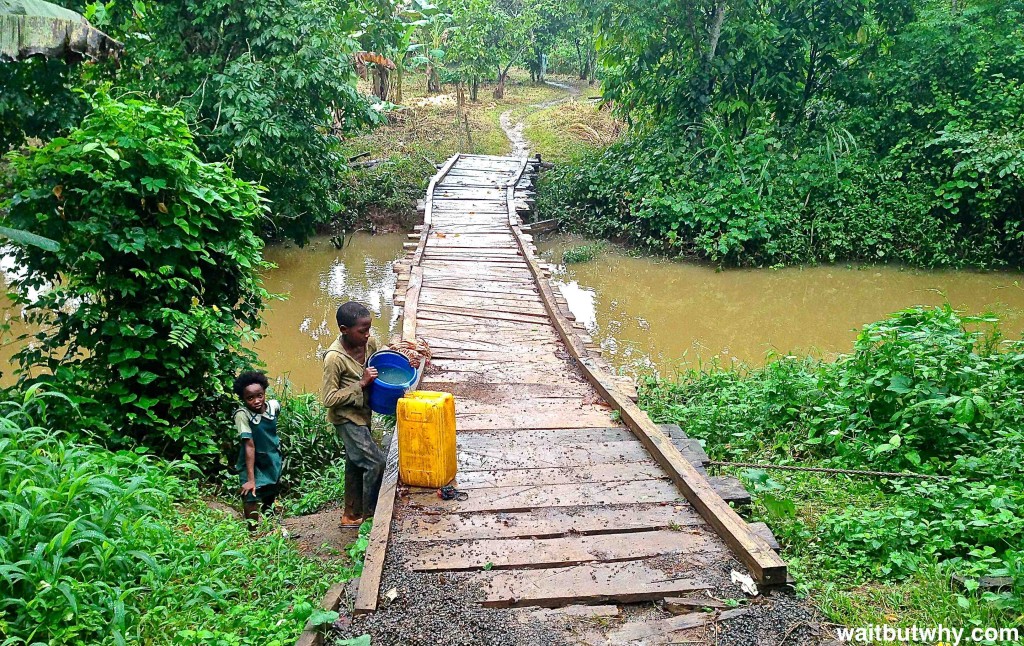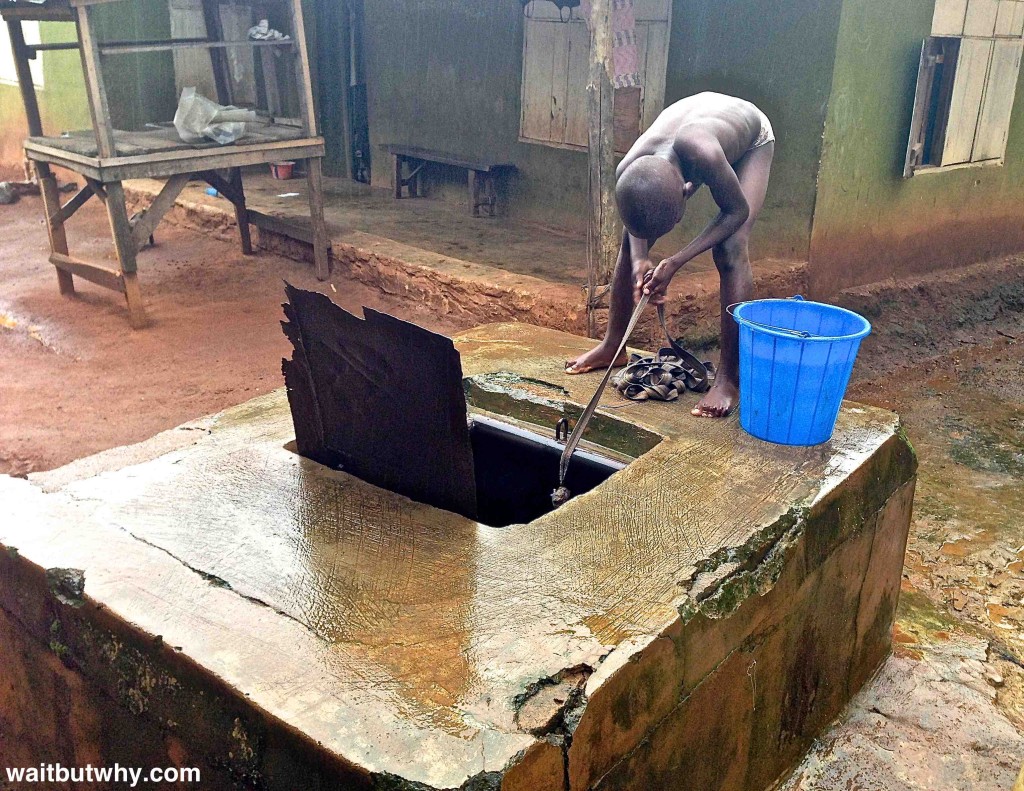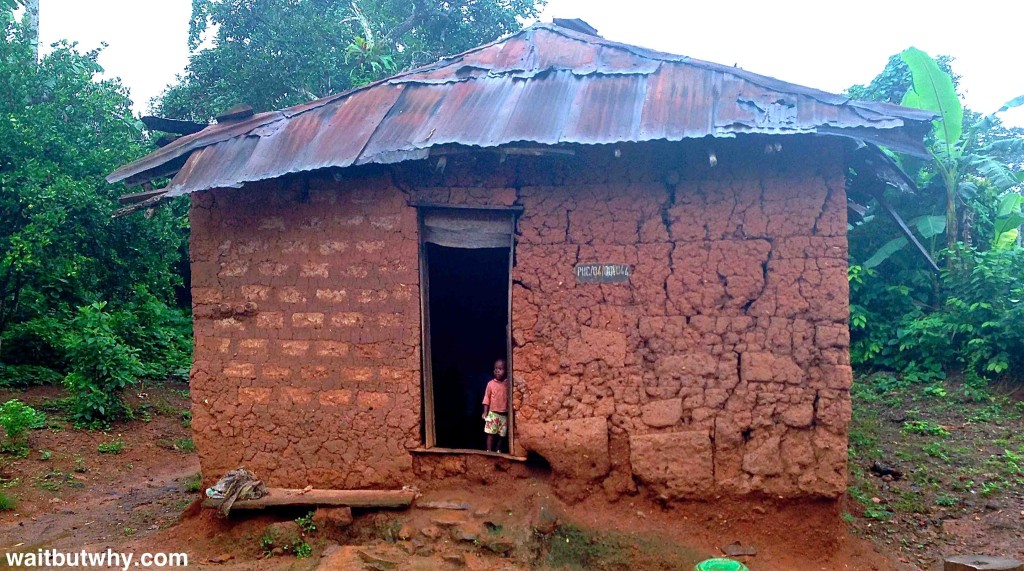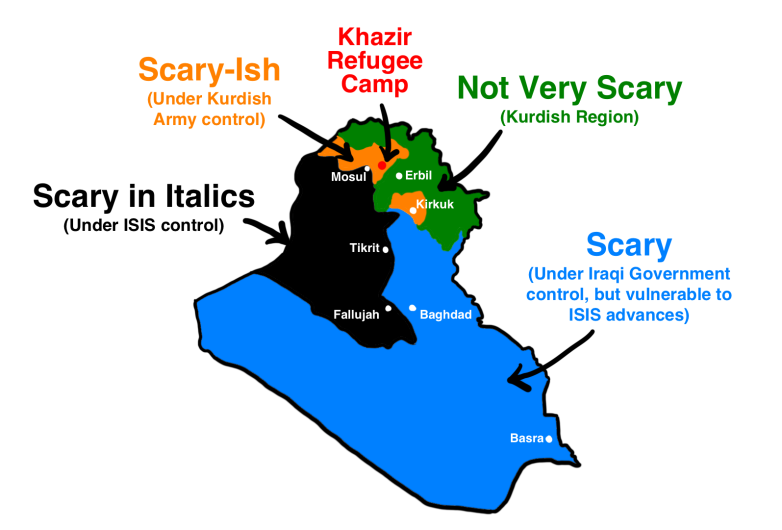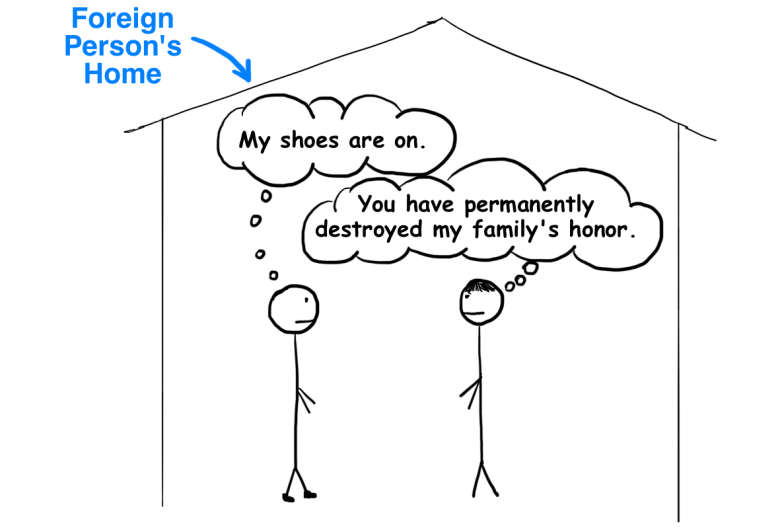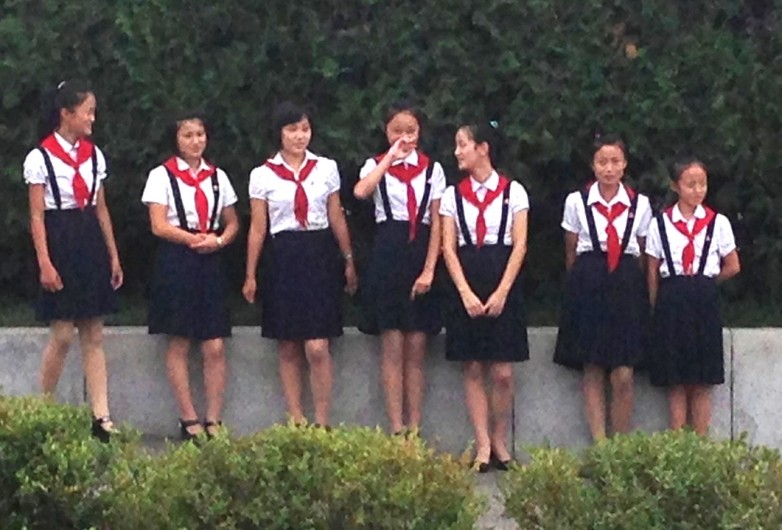If you’re not sure what Odd Things in Odd Places is and why I’m in Nigeria by myself, here’s why.
There’s not really a more jarring travel experience than spending two weeks getting used to being in Japan and then going immediately to Nigeria. They’re opposite places in almost every way places can be opposite. Even as I was checking my bag at the Tokyo airport, the woman saw where I was going and looked at me like, “Seriously though what’s your problem?”
I don’t know what my problem is. But I had apparently decided to leave the world’s most pristine, orderly, safe place to go to a place that was not those three adjectives, and there I suddenly was, standing in the middle of Africa’s biggest city, trying to not die.
But we’ll come back to my situation in a minute—let’s first get oriented on Nigeria.
About Nigeria
(All stats from the CIA World Factbook unless cited otherwise)
People:
Nigeria has a lot of Nigerians in it. So many (179 million) that if you took half of them out of the country, Nigeria would still have the highest population of any African country. There are more people in Nigeria than there are in the UK, France, and Spain combined, and 1 out of every 7 black people on the planet is a Nigerian.
Nigeria is pretty parallel to Pakistan in terms of land area, population size and population density, and Lagos, Nigeria’s mega-metropolis, is the world’s fourth largest city, comparable in population and density to Mumbai, Seoul, and Jakarta.
Nigeria also has a really young population—with a median age of 18.2, half of all Nigerians are kids 17 and under, which means that if Nigeria’s kids decided they were over it one day and formed their own country, it would be the biggest nation in Africa, and the most annoying. Combine that with one of the world’s highest fertility rates (5.25 children born/woman), and you have a rapidly growing population. Currently #7 on the country population list, by 2050 Nigeria is projected to have 440 million people and have leapfrogged up to #3 on the list, behind only India and China:
But it’s not a simple situation. All of these people are Nigerians, but really, they’re 250 different ethnic groups, speaking 510 different languages, with a British-drawn border around them. Kind of asking for trouble.
And health is a major struggle—Nigeria has the world’s 10th highest rate of infant mortality, the world’s 12th shortest life expectancy (52.6), and 3.1% of Nigerian adults have HIV/AIDS.
Religion and Ethnicity: Nigeria is one of those tricky countries that’s about half Muslim and half Christian, and while most of the population is fine with this, religious extremists create a lot of violence and ruin everything. And then there are those 250 ethnic groups, the three largest of which comprise 68% of the population—Hausa in the north (mostly Muslim), Igbo in the southeast (mostly Christian), and Yoruba in the southwest (Muslim and Christian)—and these three groups’ general annoyance with each other is behind much of the country’s violent past and political instability.
Land: Nigeria is the world’s 32nd largest country in terms of land area, or about two Californias. On top of the US, it could encompass New York, Chicago, and Atlanta:
Economy: With a nominal GDP of just over half a trillion, Nigeria has Africa’s largest economy, mostly due to its huge oil reserves—it’s the world’s 8th largest exporter of crude oil. But with a profoundly corrupt government, that wealth isn’t doing very much for the people—the infrastructure’s a mess, 24% of adults are unemployed, and two out of three Nigerians live in extreme poverty. Nigeria’s median per capita income of $493 means that a Nigerian who makes $10/week is in the top half of wealth in the country.
History in One Diagram:
The area known today as Nigeria has been home to a bunch of ancient civilizations for over 10,000 years, and in the late 19th century, the British got their tentacles involved during a period of hot European competition over spheres of influence in Africa. The area became a British protectorate in 1901, and today’s Nigeria borders were drawn in 1914. After World War II, the Nigerians were super into the British leaving, which they finally did in 1960 after setting Nigeria up with a new, representative government (which today is a federal presidential republic modeled after the American system).
So 1960 marks the first year of independent Nigeria, and also the beginning of what I can only call The Nigeria Coup Festival, a 50-year devastating struggle to gain stability and democracy.
If you’re really interested in learning about The Nigeria Coup Festival, this is a well-done 2.5-hour documentary about the history of modern Nigeria. For those who are just kind of interested, I spent a quarter of my living years gathering the highlights into the below diagram. Those who are almost entirely uninterested in Nigeria’s history should just count the big red coup dots in the timeline and understand that things have sucked. The image moves forward chronologically using the blue numbers, and you can click on the diagram to see a larger image.
Being Sibling #10 of the Adebayo Family
Before we get into what I learned in Nigeria, here’s who I learned most of it from—
The best way to learn about a foreign place is to get to know locals, and I got lucky in Nigeria. Through a friend, I was put in touch with a 31-year-old Nigerian guy named Femi, who offered to pick me up at the airport when I arrived. This turned into Femi taking me under his wing for almost the entire trip, showing me around Lagos, having me over to his apartment, sending me with his brothers to stay for half a week with their mom at their childhood home, introducing me to a bunch of other locals, and answering my roughly 12,000 questions about life in Nigeria. Convenient.
I stayed with different members of the family during the trip and got to know a few of them pretty well—it’s a mom and her nine kids, who range from the ages of nine1 to 32. After growing up in a tiny village, four of the siblings now live together in a small one-bedroom apartment in Lagos, and three others live in the smaller town of Ife with their mom in a one-room apartment. Both apartments are paid for by Femi, the second oldest sibling and the oldest guy. He was getting ready to start college when their dad got sick and died at a young age. Femi dropped his plans and started working as a professional driver to support the family, something he’s still doing a decade later, and his siblings say he’s like a dad to all of them.
And because it happens to be a ridiculously hospitable family, I just stepped my ass right in as their 10th and least useful sibling, which gave me a much better insight into life there than I normally would have gotten. Here’s what I learned along the way:
19 Things I Learned While I Was There
1) Nigerian children like to express the shit out of themselves on the airplane.
2) Just because two people are fluent in the same language doesn’t mean they can easily communicate. As a former British colony, Nigeria’s official national language is English. In reality, most people’s first language is their local Nigerian language and English is a second language they’re often fluent in but sometimes not as comfortable speaking. And many less educated Nigerians don’t speak English at all.
Femi and his siblings speak fluent English but with such a different accent to mine that sometimes when they’d speak, I wouldn’t be sure if they were speaking their Nigerian language (Yoruba) to each other, or English to me, and I’d have a little panic while trying to figure it out.
3) Racism against Asians is a go in Nigeria. At Femi’s apartment, we turned on the TV to see a popular comedy duo on stage doing a show. At one point, they started talking to different audience members, and when they got to an Asian woman, they pulled the corners of their eyes back and said “ching chong ching!” and the audience roared. Different.
4) The country’s power goes out 10 times a day on average. Which means it happened over 100 times just in my visit. The first few times it happened it jarred the shit out of me, and I’d be like “Oh would ya look at that!” before realizing that it’s really lame to make a big deal about it and what everyone else does is just continue the conversation without any acknowledgment of the situation. If you were lucky enough to be in a hotel or restaurant, a generator would bring the power back within a few minutes. But when I was in Femi’s or his mom’s apartment, the power would often stay out for hours. No one knows how long power outages will last—they can be as short as 30 seconds and as long as three days.
So there were a number of times I’d spend a full night in a room with six people, eating dinner and talking for hours, and the entire time we’d be in the dark without being able to see each other’s faces (this was fine until I tried to play with a two-year-old sitting near me before I realized that her hand was intensely liquidy with I’m not sure what and I had no way to wipe my hand off and then had to continue eating my meal with my hands, which is the traditional way to eat there).
The power issue makes most Nigerians seethe, given that they believe the government has more than enough wealth to fix the problem.
While we’re here, another infrastructure debacle that got some angry eye rolls from the people I met is the condition of the highways. On a drive from Lagos to nearby city Ibadan, a 10-mile stretch of road took us about four hours to get past because the amount of cracks and potholes in the road created utter gridlock.2 Amusingly, a stretch of gridlock is called a “go-slow” in Nigeria, and part of a Nigerian go-slow is utter lawlessness, as cars do insane things like drive over the median and weave around cars going in the opposite direction to speed up their drive. To spice things up, apparently police officers sometimes come walking through the gridlock and mug people—I was told to keep my phone out of sight for this reason. I offered a glimpse of a few go-slows at 2:42 in the Nigeria video.
5) It turns out that being white is a conspicuous quality in Nigeria. At one point on a car ride, I saw this written on the truck in front of us:
There was that word again. Oyinbo. I had assumed it was a slang way of saying a friendly “hello,” since that was what people on the street kept saying to me as I walked by. To confirm, I asked people in the car with me what it meant. They smiled. “It means white man.”
Well would ya look at that.
I thought about it and realized that since leaving the airport days earlier, I had not seen even one other white person.
And I sensed that the more rural a place we were in, the more surprised people were to see me. In small towns or villages, when someone would see me walk by, they’d look at me, then look away, then do a sudden double-take and with wide eyes and big smile, they’d get the attention of the other people with them and then they’d all look at me with wide eyes and big smiles—delighted and amused at the rare sighting.
I’m sure with a history of European occupation, race is as complicated an issue in Nigeria as it is anywhere else, but as far as my own experience there, I sensed no negativity at all—only exceptional friendliness—including the roughly 2,500 times someone called me oyinbo during the trip, which never came across as carrying any hostility.
(Quick pause for experienced Sub-Saharan Africa travelers to patronizingly pat me on the head.)
One other funny thing that kept happening is kids would regularly study my hand or arm or touch (or pull) my hair, which Femi’s brother explained was because they probably hadn’t ever seen a white person up close before. Here’s an example—and I’m not sure why my arm looks like a corpse’s arm either so don’t ask:
6) A guy I met told me that he had no full siblings but over 20 half siblings because his father has seven wives. I just needed to tell you.
7) Nigeria is not a good place to be gay. In January 2014, President Jonathan signed into law the Same Sex Marriage Prohibition Act, which jails people for 14 years for gay marriage and 10 years for “other violations of the law.” And if you keep quiet about your friend being gay, that can get you 5 years of jail time. As soon as the law was passed, the police started arresting people.
8) A baby’s arm can also serve as a handle. I kept seeing people pick up a baby or toddler by the arm and displace it to a new location in that manner. This didn’t appear to hurt or bother the child at all and is both hilarious and practical. I’ll be adopting this practice for all future dealings with children.
9) A lot of people think President Goodluck Jonathan is stupid and blame him for allowing terrorist group Boko Haram to wreak such havoc. Boko Haram is a militant Islamist terrorist group that has been killing and kidnapping throughout Northern Nigeria for the last five years, killing over 2,000 civilians already in 2014. Their name is oddly specific, meaning “Western education is forbidden,” their goal is to turn Nigeria into a hard-line Islamic state, and their leader wants to kill a lot of people. You probably remember hearing a lot about them when they kidnapped over 200 school girls in April, before the news got bored and moved on to other things.
As for the president, A) I learned that Goodluck and Jonathan are both a common first and last name in Nigeria, respectively, and B) He’s a Lyndon Johnson—i.e. he was the vice president but after the president died he took over, and has since won election, and the people I talked to think the original president would have done a lot better at dealing with Boko Haram.
And while we’re making overarching statements about Nigeria based on a tiny sample size of personal opinions I encountered…
10) A lot of people think that most of Nigeria’s super-wealthy are selfish, greedy, and far more interested in protecting the status quo and their elite position than in improving the country’s future, and this is disastrous because they have great sway over the corrupt government’s policies. Yeah yeah I know, this is exactly the problem with your country too—but something tells me your country’s corruption/inequality issues are less extreme than Nigeria’s.
11) Nigeria has a prolific film industry called Nollywood. Nollywood puts out two hundred movies a week, topping the output of Hollywood and coming in second only to Bollywood.
12) Education is revered in Nigeria. Education being revered is a pretty universal concept, but it’s especially valued in Nigeria. One piece of evidence for this is the 2006 US census finding Nigerians living in the US to be “the highest educated ethnic or racial group in the country,” with 17% having a master’s degree or higher.
13) Left hands are taboo. Given that I’ve encountered this exact taboo multiple times before in the Middle East and Asia, you’d think I’d have it down by now, but I messed up at least five times by doing things like touching my food with my left hand or handing something to a person using my left hand, getting scolded for doing so each time. The idea is that people there use their left hand for all things dirty, and the right hand is kept clean for things where cleanliness matters. And after spending a four-day stretch in a rural area with no access to soap of any kind, I understood why this wasn’t just for the hell of it—it was an important health practice.
But—
14) Men holding hands with their male friends is not taboo. A product of the American system of taboos, I was jarred when I was walking alongside Femi and he started holding my hand. And I’m not talking about the milder mitten-hand grasping position—this was the full interlocking fingers position. In my experience, the mitten-hand position is mainly for dating couples and parents/kids with maybe a few other applications, but the full finger interlock is only for seriously dating couples. I finally gathered the guts to ask Femi about this, and he told me it was a very normal thing to do with your friends. Later, his brother would do the same thing to me. This time I was prepared and just got into it because fuck it, I’m in Nigeria and we’re holding hands and this is what’s happening.
15) The only thing you actually need to play ping pong is a ping pong ball.
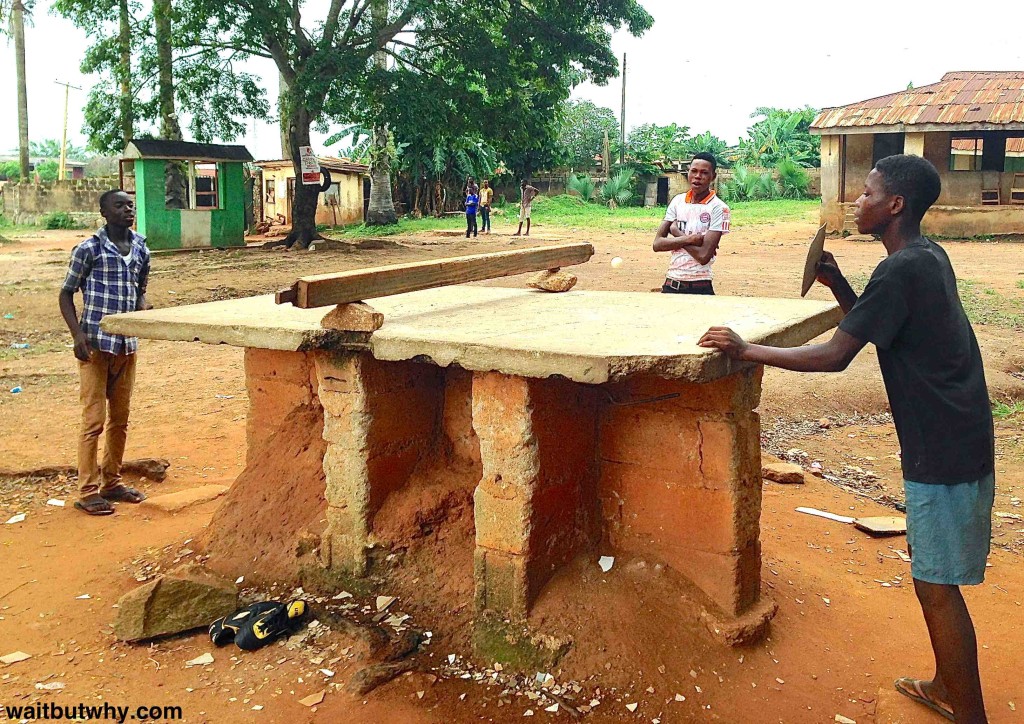
(The paddle is a rock if that’s not clear.)
16) You can fit up to 20 chickens on top of your car if you ever need to.
17) Framing this baby’s face with a cloth is a fun activity.
18) When it comes to corruption and scamminess, Nigeria has a bad reputation for a good reason. For its entire modern existence, Nigeria has had a problem with crookedness, and it spans from the top to the bottom of society:
The Top
Since the country gained independence in 1960, almost every single government that has been in charge—whether it be one of the four republics or one of the military dictatorships—has been accused of being rife with corruption. Even in the last 16 years, during their longest-lasting period of civilian democracy, all four of the recent elections so far have been widely condemned for alleged vote-rigging. Transparency International’s 2013 Corruption Perception Index, which ranks countries from most clean to most corrupt, puts Nigeria at 144th out of 177 total countries.
The Middle
Dealing with crooked lower-level government officials—cops, security guards, checkpoint officers—is a ubiquitous way of life in Nigeria. This part I experienced first-hand—about 40 times. Almost every time I was in a car, we’d be stopped at a checkpoint and go through the same routine—the officer would ask us to roll down the window, reach in and shake my hand, and then smile and say something like, “So what do you have for me today?” I’d give him the equivalent of $2 or $4 or $5 and then we’d continue on our way. When we stopped at a famous landmark to take a look, a couple men who either worked there or patrolled the area would inevitably come over to us and collect money. When I was in a busy outdoor market, I took a picture and a few seconds later I was pressured to pay a “photo fee” to a guy who walked over and said he’s in charge of the market (Femi told me he was more or less a mafia guy). I’m not sure how things would go down in any of these situations if I refused to pay, but I decided not to find out, and nothing bad beyond these small payouts ever happened.
The Bottom
Everyone who uses the internet has at some point encountered a Nigerian scam. Some are openly Nigerian—like the infamous “A Nigerian prince just died and we need to send his fortune to a safehaven overseas and if you agree to accept this payment you will be paid $4.3 million for the service, which all makes perfect sense I promise” email. Some are run out of Nigeria but don’t mention the country specifically—like an email responding to your Craigslist couch-selling ad that offers, in odd-sounding English, to pay you exactly what you asked for (the scam is that they send you way more than the price “by accident” and then ask you to wire them back the excess—the money they sent appears to actually be in your account so you send them the excess. Then a couple weeks later, the bank realizes it was a fake check and you’re on the hook for all of it…but the “excess” money you wired was real money and the scammer has taken it and disappeared).
I came to Nigeria excited to learn more about the people who run these scams so asked a bunch of questions. Apparently, Nigerian people call these scammers “Yahoos” (pronounced “ya-OOZE”) because they always used Yahoo to carry out their scams, back when Yahoo was something humans used. And word is that they don’t bother scamming Americans much anymore because Americans no longer tend to fall for the tricks—instead, they’ve moved onto Denmark and Norway, two places where they’re having great success now. I learned that one scam that’s hot right now is convincing some poor lonely Danish man that you’re a pretty American girl (by creating a fake Facebook account and stealing photos from some random other Facebook account), spending a couple months forming a relationship with the man, and then asking the man to send money for a flight so you can come visit him. Which he does and then never hears from you again. They even have a machine that makes a man’s voice sound like a woman’s, which they use to talk to the man on the phone. Good, honest work.
At one point, Femi’s brother made the mistake of mentioning to me that he plays soccer/football with a Yahoo. Captivated by the prospect of meeting a real live Yahoo, I casually brought this up about 25 times until he finally agreed to introduce me (after I promised not to mention scams for any reason during the meeting). We went to the Yahoo’s house, and though I never made it in the house, the Yahoo and his three Yahoo friends came out to the sidewalk and chatted with us for a few minutes before getting bored and going back inside. I took stealth photos, like a lunatic, and now I guess I’m putting them on the internet?
So here you go—the bodies of real life Yahoos! (I really didn’t want to blur the faces, but I can’t take a chance of these guys getting caught and then taking some revenge against Femi’s brother.)
Those are the dudes emailing you about Nigerian princes. Femi told me that they’ve gotten really rich since they started scamming—but that they were also taking a huge risk. Cops are looking for Yahoos, and young guys are often stopped at checkpoints to have their laptops checked. If they get caught, they receive a 20-30 year prison sentence.
He also said that Yahoos are pretty despised by most of society, which highlights the sad fact that most Nigerians are perfectly honest people, and they just have to live with all of this sleazy bullshit around them, not to mention having their reputation stained because of it—people around the world are wary of doing business with Nigerians.
So to review, we’ve learned so far in this post that Nigerians are enduring pervasive corruption, a roller-coaster of government instability, rank inequality, religious violence, dire health issues, and crushing poverty. Which makes it highly surprising that—
19) A study done by World Values Survey found Nigeria to be the world’s happiest nation.
Huh?
First, I checked whether World Values Survey is legit—it is. Then, I started reading about why this would be the case, and supplementing that with my own attempt to figure it out when I was there. Here are two explanations:
1) Nigerians are super religious. Islam has played a large role in northern Nigerian life for centuries. Nigerian Christians were typically moderate Catholics for the most part up until the 1970s, but when the 80s and 90s were run by harsh military dictatorships and life was pretty dire, Christian missionaries had great success igniting a full-fledged Evangelical movement throughout the country, which is a huge part of the culture today. Religiousness seems like a necessary ingredient of a badly-suffering-but-also-super-happy country.
2) Nigerians have an unusual level of optimism. This isn’t just an observation. Consecutive Gallup polls in 2010 and 2011 found Nigeria to be the world’s most optimistic nation. Optimism has long been linked to happiness in psychology, and Nigerians tend to believe that though things may be bad, they’re looking up. My experiences corroborated this—everyone I got to know in Femi’s family had big ambitions and an excitement about the future.
Nigerians being exceptionally happy is yet another piece of proof that happiness is completely about your mindset and not at all about the external world around you.
And here’s the Nigeria video. Everything I saw and did, compressed into 288 seconds:
And a few village photos, because I couldn’t help myself:
The other stops:
Russia
Japan
Iraq
Greenland
The genie question I asked people in all five countries
And another time, North Korea
_______
If you like Wait But Why, sign up for our unannoying-I-promise email list and we’ll send you new posts when they come out.
To support Wait But Why, visit our Patreon page.
Being a nine-year-old boy sucks. John is the nine-year-old and youngest child in Femi’s family. He’s a great kid—mature for his age, laughing all the time, and really bright. He’s also the world’s bitch. This isn’t specific to Nigeria, of course—nine-year-old boys across the planet are the absolute lowest rung of the human ladder. Nine-year-old boys are too old to get special kid treatment, too young to have seniority over anyone else, and people tend to be more comfortable making a boy that age do unpleasant manual labor than a girl. And John’s life was case-in-point. If a low-grade manual job was anywhere to be found, someone was yelling at John to go do it. And he’d just take everyone’s shit, because that’s what a nine-year-old boy just has to do.↩
This was not pleasant. Our air conditioner wouldn’t work when the car wasn’t moving, so I spent the four hours breathing in dense fumes from surrounding cars. On top of that, the driver was blasting music upsettingly loud and being nausea-inducing by accelerating forward and then jerking on the brakes anytime there was 10 feet of open space to move, and I was playing an infuriatingly hard Candy Crush level the whole time that I couldn’t beat (181). Not a high point of the trip.↩
